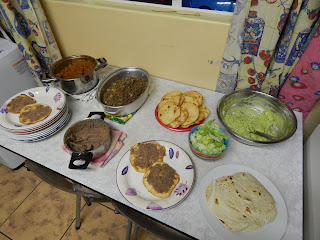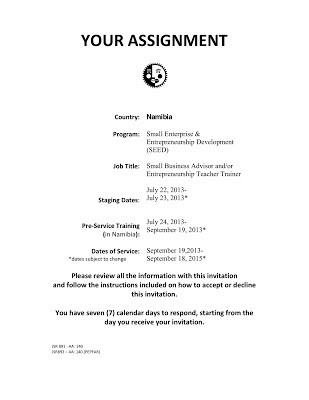The first week you are super excited! I
got to my new house in Rundu, and after traveling all day I was so
tired all I wanted to do was sleep... So I moved my bed, washed a few
walls (the joys of living in a house that has been occupied by boys
for years), hung my mosquito net and went to bed.... I was really
hoping to get some Parks and Rec in but, my computer crashed that
night... so that didn't happen. I woke up the next morning and went
to breakfast with Gio, the best 1-week roommate I have ever had, and
I met some PCV's. Meeting PCV's who have been in country a while
feels like the first day of school, and I am a freshman all over
again... good thing most of the PCV's I have met are really great!
Nothing like having to fit into a new social group, especially
because for the next 2 years, they are the ones who will help you
through the ups and downs, so having them around is really important.
The following week I started work at my
new office in the Rundu Youth Center. I was so excited for my
posting, I am doing exactly what I have always wanted to do, develop
programs for youth, focusing on pressing social issues, unemployment,
HIV/AIDS and business training. This is why I moved 9,181 miles away
from home, I was stoked! The first morning we had a staff meeting, I
introduced myself in my best Rukwangali, remembered no names of my
co-workers from the meeting, and then started building relationships
with the group of people that will become my closest friends while I
am here.
Here's the thing about being a new PCV, we are supposed to spend the first few months at site observing. This is a great structure, and it really is important to learn our new community and places of employment in and out so that we can make as big of an impact over the next 2 years... the downfall... it's boring, really, really, boring. Our first week some volunteers who had been living in Rundu for 2 years took us around to meet important people in our community, and start building relationships with the town council, police commissioner, doctors, etc. in short, I have met a lot of people, it's super overwhelming, but necessary.
My second week my boss told me that we
were going to be going on a trip to take a group of youth from the
San community called Omega to Windhoek (the capital) and Ondera Farms
so that they could see more of Namibia and get some hands on
training, so that they could use grant money they received
appropriately. Turns out this was a 2 week long lesson is lowering
expectations. We were supposed to leave on Sunday, we left the
following Thursday, Africa time and June time don't really see eye to
eye... this so far is my greatest challenge. We left to Windhoek,
which ended up being really fun, I was able to buy a new computer and
hang out with other PCV's who happened to be in Windhoek at the same
time. Windhoek also had its challenges, mostly organization wise, but
everything came together in the end and it was a fun few days.
We left to Ondera Farms Monday, which
is in the North, I had no idea how long we were going to stay but
flexibility is key around here... I have started doing Yoga to help
with this... We got to the farm to find no bedding, which of course,
I didn't bring any, no stove, no boss, and no cell phone network...
this proved problematic later. Thankfully I brought a big towel,
turns out towels can also be pillows... good thing Namibia is hot and
I didn't need a blanket. Not having a stove was great because the
girls taught me how to build a fire and cook outside, which is great
because I didn't posses this skill before this trip. No network... we
will talk about that later.
The trip had it's ups and downs, and in
order to keep this blog professional I wont get into specific
details. The farm had its positive moments, when we were on the farm
I saw that they were growing watermelon, while we were in Windhoek
the head of the Youth Center there taught the youth a song that
involved watermelon, but some of them had never tasted watermelon. I
asked the farm supervisor if we could have one to taste after dinner,
and he said that was perfectly fine, so we shared a watermelon after
dinner. I was able to start connecting to the youth and start
talking to them about their community and what they hoped to see it
grow into one day.
As far as the downs...Alcohol tends to
be a problem in Namibia, and although it is accepted, it bothers me
greatly, but the biggest most upsetting issue that I am dealing with
is men treating me like I moved to Namibia for their pleasure. One
day on the farm, while dealing with a drunk adult, and another that
didn't want to be there I was already reaching my limit, when one of
the men who runs the farm approached me, in the dark about coming to
Rundu and giving a workshop on farming. During our conversation that
morning, the questions got uncomfortable, but I held my friendly
demeanor, trying not to assume his intentions. While holding my arm
he continued asking me questions that grew more inappropriate with
time, like if I have a roommate, where will she stay when he comes,
do I share a room with my roommate, then he actually said to me, “I
have never had a white woman before...” as most of you can imagine,
I damn near lost my mind.
The whole day and stress from the trip
continued to build and I found myself sobbing behind the barn, in the
dark, unable to call or text anyone. The little things that we think
would not affect us, like alcoholism, isolation and jackass men,
broke me down... maybe it's because this all took place in one day
with a lot of build up, or maybe I just hit my maximum... all I could
do was go into the house, write it all in my journal and cry myself
to sleep into my towel. I woke up the next morning, and had a
wonderful day.... the ups and downs will give you whiplash if you
aren't prepared.
The hardest part is the realization and
acceptance that this is after all, what I signed up for.
I got pretty lucky with my assignment,
my office has wifi and air conditioning, I have a nice two bedroom
flat with a great roommate, I have running water and electricity and
Rundu is a small town but is has everything that I could ever need.
Living in town is often seen as easier because goats don't run
through my house, and I can turn my fan on at night making it much
easier to sleep, however the downs are things like having to buy
electricity, people are always trying to get into my house through my
burglar bars, and I get to walk 45 minutes to work everyday. It is
not uncommon to feel isolated in a town, because there are so many
people, where do you start. But, I have been lucky with great co
workers who take me to the river, and church and welcome me into
their families. They are so excited that I want to learn Rukwangali
that they SMS (text) me all day in the language. They truly care
about me and my well-being, I never feel unsafe.
They teach us in training that no
matter how happy we are in our new life, there are always little
things that happen that make us feel like the car is about to fly off
the rails and make you want to give up and go home. I guess without
the ups and downs I would come home the same exact person I was when
I left home, which is not what I want at all... character building is
all part of it, and I am sure that I will change more than I am able
to change Namibia, and the ups and downs will happen less and
less.... this next two years just wouldn't be the same without the
challenges of adjusting.
Other lessons learned:
- Always carry a camera, I missed some beautiful photo opportunities on the farm by not having a camera. That is also why there are no pictures on this blog.
- Always carry a blanket, it probably makes a better pillow than a towel.
- Continue to journal, it's a good outlet.
- Lower expectations, and don't take things so personally. For example: a few of my co-workers were calling me fat, not in a mean way, more in a matter of fact way, after a few days of this I told them that in my culture when you call someone fat you are also saying they are ugly... they were instantly apologetic and reassuring that I am not ugly, and it's not bad that I am not skinny.
Namlish Lesson:
- Footing = Walking ie: did you foot today?
- Having is used differently ie: are you having a pen?
- Now means later, now now means now
- I'm coming, often used in place of I'm going, and when used correctly, it means in about 10 minutes


























